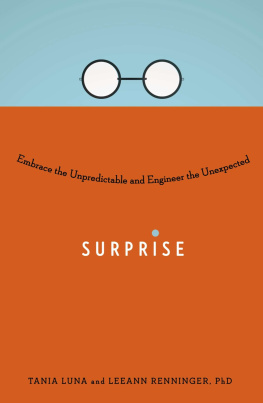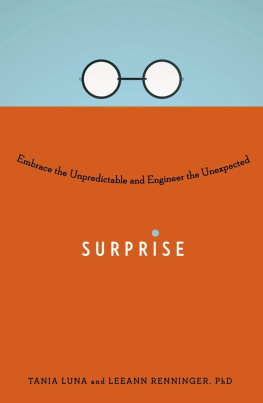Dr. Michael A. Rousell is a teacher, psychologist, and professor emeritus at Southern Oregon University. Rousell studied life-changing events for more than three decades and established his expertise by writing the internationally successful book Sudden Influence: How Spontaneous Events Shape Our Lives (2007). His pioneering work draws on research from a wide variety of brain sciences that show when, how, and why we instantly form new beliefs. He lives with his spouse in Edmonton, Alberta, Canada.
This book contains brilliant ideas, discoveries, and theories by those mentioned in my references. To all of them, I offer my utmost regards for their hard work, creativity, and influence. I synthesized their efforts within my conceptual framework to produce the book you are about to read.
Special thanks to those who told me their stories of influence about how surprise played a role in their formative moments. These stories breathe life into science.
This book took an inordinately long time to move from conception to print. Literary consultant Elizabeth Lyon stayed with me through countless rewrites. Her skills in editing played an instrumental role in this work. She frequently referred to me as a poster boy for perseverance. Thanks also to my editor Suzanne Staszak-Silva at Rowman & Littlefield who encouraged and nurtured me through the publishing process.
On a personal note, my wife and children indulged me and allowed me to spend thousands of hours on research and writing. I tried not to cheat them out of the important things in life. That said, I could have cleaned, painted, mended, and cooked more often. I love you and appreciate your patience and support.
I dedicate this work to my grandchildren: Paige, Lauren, Kaitlin, and Nathalie. They inspire me to be better every day. I have not met that mark, but they love me nonetheless.
To Laura, to whom I owe everything, and to my daughters Leanne and Kary, who know courage.
Abolafia, Mitchel Y. Narrative Construction as Sensemaking: How a Central Bank Thinks. Organization Studies 31, no. 3 (2010): 34967.
Achor, Shawn. The Happiness Advantage: The Seven Principles of Positive Psychology that Fuel Success and Performance at Work. New York: Random House, 2011.
Adler, Jonathan E. Surprise. Educational Theory 58, no. 2 (2008): 14973.
Aguiar, Henrique. The Inner Workings of the Human Mind. Medium.com. August 2, 2018. https://medium.com/@henriquereisaguiar/the-mysterious-mechanisms-of-the-mind-e2c2340b5e4b.
Alaa, Ahmed M., and Mihaela Van Der Schaar. Balancing Suspense and Surprise: Timely Decision Making With Endogenous Information Acquisition. Advances in Neural Information Processing Systems (2016): 291018.
Alban, Deanne. How to Increase Dopamine Naturally. Be Brain Fit. 2012. https://bebrainfit.com/increase-dopamine/.
Allen, James B., Douglas T. Kenrick, Darwyn E. Linder, and Michael A. McCall. Arousal and Attraction: A Response-Facilitation Alternative to Misattribution and Negative-Reinforcement Models. Journal of Personality and Social Psychology 57, no. 2 (1989): 261.
Almenberg, Johan, and Anna Dreber. When Does the Price Affect the Taste? Results from a Wine Experiment. SSE/EFI Working Paper Series in Economics and Finance no. 717 (2010).
Ambady, Nalini, and Robert Rosenthal. Thin Slices of Expressive Behavior as Predictors of Interpersonal Consequences: A Meta-analysis. Psychological Bulletin 111, no. 2 (1992): 256.
Anderson, Eric, Erika H. Siegel, Eliza Bliss-Moreau, and Lisa Feldman Barrett. The Visual Impact of Gossip. Science 332, no. 6036 (2011): 144648.
Angela, J. Yu, and Peter Dayan. Uncertainty, Neuromodulation, and Attention. Neuron 46, no. 4 (2005): 68192.
Ariely, Dan. Payoff:The Hidden Logic That Shapes Our Motivations. New York:Simon and Schuster, 2016.
Aron, Adam R., and Russell A. Poldrack. Cortical and Subcortical Contributions to Stop Signal Response Inhibition: Role of the Subthalamic Nucleus. Journal of Neuroscience 26, no. 9 (2006): 242433.
Arriaga, Moises, and Edward B. Han. Structured Inhibitory Activity Dynamics During Learning. bioRxiv (2019): 566257.
Badgaiyan, Rajendra. Neuroscience of the Nonconscious Mind. Cambridge, MA:Academic Press, 2019.
Baldassarre, Gianluca, Tom Stafford, Marco Mirolli, Peter Redgrave, Richard M. Ryan, and Andrew Barto. Intrinsic Motivations and Open-Ended Development in Animals, Humans, and Robots: An Overview. Frontiers in Psychology 5 (2014): 985.
Bkgaard, Per, Michael Kai Petersen, and Jakob Eg Larsen. Separating Components of Attention and Surprise. arXiv preprint arXiv:1608.08492 (2016).
Bandura, Albert. Self-efficacy: Toward a Unifying Theory of Behavioral Change. Psychological Review 84, no. 2 (1977): 191.
Bargh, John A., Peter M. Gollwitzer, Annette Lee-Chai, Kimberly Barndollar, and Roman Trtschel. The Automated Will: Nonconscious Activation and Pursuit of Behavioral Goals. Journal of Personality and Social Psychology 81, no. 6 (2001): 1014.
Bargh, John A., Kay L. Schwader, Sarah E. Hailey, Rebecca L. Dyer, and Erica J. Boothby. Automaticity in Social-Cognitive Processes. Trends in Cognitive Sciences 16, no. 12 (2012): 593605.
Barrett, Lisa Feldman. How Emotions Are Made: The Secret Life of the Brain. New York: Houghton Mifflin Harcourt, 2017.
Barrett, L. F., R. Adolphs, S. Marsella, A. Martinez, and S. D. Pollak. Emotional Expressions Reconsidered: Challenges to Inferring Emotion from Human Facial Movements. Psychological Science in the Public Interest 20, no. 1 (2018).
Barto, Andrew, Marco Mirolli, and Gianluca Baldassarre. Novelty or Surprise? Frontiers in Psychology 4 (2013): 907.
Bellet, Clement, JanEmmanuel De Neve, and George Ward. Does Employee Happiness Have an Impact on Productivity? Sad Business School WP 13 (2019).
Bellucci, Gabriele. Psychological and Neural Dynamics of Trust. PhD diss., 2020.
Belova, Marina A., Joseph J. Paton, Sara E. Morrison, and C. Daniel Salzman. Expectation Modulates Neural Responses to Pleasant and Aversive Stimuli in Primate Amygdala. Neuron 55, no. 6 (2007): 97084.
Benchenane, Karim, Adrien Peyrache, Mehdi Khamassi, Patrick L. Tierney, Yves Gioanni, Francesco P. Battaglia, and Sidney I. Wiener. Coherent Theta Oscillations and Reorganization of Spike Timing in the Hippocampal-Prefrontal Network Upon Learning. Neuron 66, no. 6 (2010): 92136. Berger, Jonah. The Catalyst: How to Change Anyones Mind. New York: Simon and Schuster, 2020.
Berger, Jonah. Invisible Influence: The Hidden Forces That Shape Behavior. NewYork: Simon and Schuster, 2016.
Bilalic, Merim, and Peter McLeod. Why Good Thoughts Block Better Ones. Scientific American 310, no. 3 (2014): 7479.
Bitbol, Michel. Neurophenomenology of Surprise. Surprise at the Intersection of Phenomenology and Linguistics 11 (2019): 9.
Bloom, Paul. How Pleasure Works: The New Science of Why We Like What WeLike. New York: Random House, 2010.
Boll, Sabrina, Matthias Gamer, Sebastian Gluth, Jrgen Finsterbusch, and Christian Bchel. Separate Amygdala Subregions Signal Surprise and Predictiveness During Associative Fear Learning in Humans. European Journal of Neuroscience 37, no. 5 (2013): 75867.
Borwein, David, Jonathan M. Borwein, and Pierre Marechal. Surprise Maximization.










